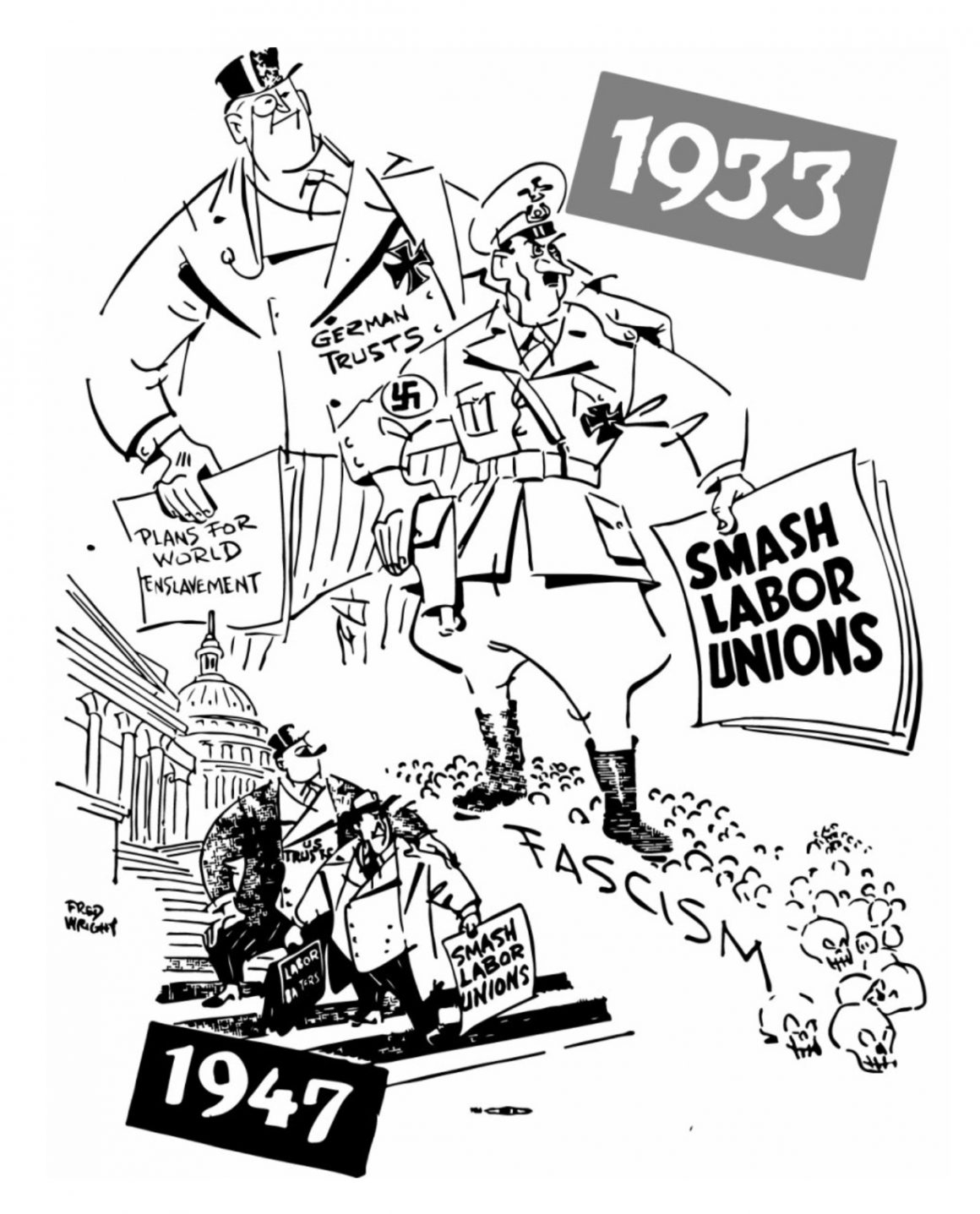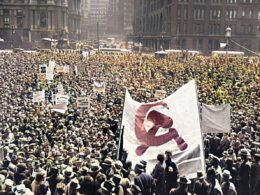In 1980, when neoliberal austerity was beginning to be implemented, Bank of America CEO Tom Clausen issued a warning for his fellow members of the bourgeoisie. He concluded that “When people are desperate, you have revolutions. It’s in our own evident self-interest to see that they are not forced into that. You must keep the patient alive, because otherwise you can’t effect the cure.”
This year, Bank of America’s leadership articulated a different view towards how the capitalist class should relate to the workers. In a memo on which developments would be beneficial for the Bank, an economics researcher tells these leaders that: “A modest further rise in the [jobs] participation rate should help push up the unemployment rate, but we think most of the increase will likely come from weaker demand for workers. By the end of next year, we hope the ratio of job openings to unemployed is down to the more normal highs of the last business cycle.”
This means Bank of America, and all the other big banks or corporations by extension, view worsened conditions for workers as the favorable outcome from a profits perspective. The memo is speaking to the pandemic’s phenomenon of workers gaining leverage over employers, which can only be reversed by driving the workers into even worse circumstances. The bourgeoisie want the people to get more desperate than they already are so that they’ll accept an intensification of their own exploitation. Which is consistent with the way both parties are treating workers. By signing a bill forcing a compromise for the rail workers, Biden has sabotaged their effort to fully gain their rights. Any Democratic partisan who tells you otherwise is lying. Until the labor movement gains enough power to either intimidate the state into going back on this decision, or replace the current state with a workers state, the workers will continue living in this coercive arrangement.
We all know that the latter scenario of revolution is going to be the only one in which justice is possible. The ruling class will never again be willing to make the compromises that FDR made, and that Clausen said would need to be maintained in order to avoid an uprising. This is because since Clausen made that statement, capitalism has been in a stage of decline that’s too advanced for the class reconciliations of the past to ever again be viable. To keep up profits, the bourgeoisie need to wage a progressive and unending war against workers rights. Otherwise the socioeconomic order will fall apart, and proletarian revolution will come anyway. So the bourgeoisie’s best option is to continue driving up exploitation, and hope revolution can be prevented despite the ever-growing contradictions this creates.
The consequences, at least until our revolutionary institutions become strong enough, are an expansion of suffering that can’t be stopped for the time being. As long as the dictatorship of capital exists, it can only keep tightening its grip. Which has destructive effects on every level, from the stability of the climate, to international relations, to the mental health of those trapped in capital’s coercive machine. This last month, a Starbucks barista said: “people wonder why we need a union at Starbucks…there’s so many customers, and we have four people on the floor all day. Only five people were put on the schedule, and somebody had to call out…we don’t have fair scheduling, our managers don’t care about us, our manager was supposed to come in this weekend and took himself off the schedule so he wouldn’t have to be held accountable for calling out…We need a union because this can’t happen. This can’t happen because we need fair scheduling, we need managers to hold themselves accountable for helping their workers.”
This worker’s impulsive rant to his camera went viral, and he was mocked because of how he said it while in tears. The sentiment behind those who laughed at him was that even though it’s relatable to feel like crying because you’ve been hit with a combination of overwhelming things, in his case being a student who now had to spread his barista work thin while multiple customers were regularly getting angry at him for something not his fault, you supposedly should keep your breakdowns to yourself. Implied in this is the idea that if you’ve ever been reduced to an unsound state of mind by what our society does to you, you have no hope of changing your circumstances, as you’ve shown vulnerability and therefore supposedly aren’t capable of becoming assertive. Yet my reaction to watching it is: “this is the kind of worker who has the potential to become the most dedicated kind of revolutionary militant.”
If you relate to the crying barista student, if you’ve ever been made to feel overwhelmed by our socioeconomic system, you have knowledge of what kind of thing we need to fight against. Our conditions are cold and cruel, they break you. But what happens after you’ve been broken? What does the ruling class expect after it’s created a population that no longer has anything to lose by rising up? More and more workers like the barista are coming to class consciousness. They’re going through a developmental process in which they initially make mistakes, such as wanting to take militant action without regard for the conditions. Yet this process can ultimately make them come to the conclusion of the Indian Marxist Bhagat Singh:
Let me announce with all the strength at my command, that I am not a terrorist and I never was, expect perhaps in the beginning of my revolutionary career. And I am convinced that we cannot gain anything through those methods. One can easily judge it from the history of the Hindustan Socialist Republican Association. All our activities were directed towards an aim, i.e., identifying ourselves with the great movement as its military wing. If anybody has misunderstood me, let him amend his ideas. I do not mean that bombs and pistols are useless, rather the contrary. But I mean to say that mere bomb throwing is not only useless but sometimes harmful. The military department of the party should always keep ready all the war-material it can command for any emergency.
It’s when one has reached that point of pragmatic class struggle, in which they’re willing to fight capital not just with militant passion but also strategic patience and restraint, that they become a serious threat to capital. The dynamic that I’ve come to after years of developing as a Marxist is watchful waiting. Every other day I work out, all the time I work to help complete my cadre’s set of necessary tactical equipment, constantly I try to gather more theoretical knowledge. But I don’t yet take action, not anymore than what my party instructs me to do. I need to hold myself back until our revolutionary organizations get sufficiently built up, and they become capable of challenging the state’s authority. Every time I participate in party-building and mass educational efforts, I do so with the knowledge that when my movement gets powerful enough, we’ll provoke the state into imposing a brutal military crackdown. And I’ve accepted these consequences, because I’m aware of the route towards outmaneuvering the state.
The direction of neoliberalism is not towards reform. It’s towards intensifying capitalism’s contradictions until class tensions re-emerge, utilizing fascism to try to put down the uprising, and then further losing control due to provoking the people through reactionary violence. The capitalist state is creating for itself the scenario that Che described in Guerrilla Warfare: A Method:
These dictatorships carry on within a certain “legal” framework adjudicated by themselves to facilitate their work throughout the unrestricted period of their class domination. Yet we are passing through a stage in which pressure from the masses is very strong and is straining bourgeois legality so that its own authors must violate it in order to halt the impetus of the masses. Barefaced violation of all legislation or of laws specifically instituted to sanction ruling class deeds only increases the pressure from the people’s forces. The oligarchical dictatorships then attempt to use the old legal order to alter constitutionality and further oppress the proletariat without a frontal clash. At this point a contradiction arises. The people no longer support the old, and much less the new, coercive measures established by the dictatorship and try to smash them. We should never forget the class character, authoritarian and restrictive, that typifies the bourgeois state.
Che’s words provide hope to the situation that the barista spoke to. To delay its collapse, capital is paradoxically sacrificing the social stability it depends on. Starbucks is waging war against unionization attempts by closing down its locations, only able to maintain its abusive control over the workers who are the most vulnerable. Bank of America wants to increase the number of people who are in those desperate circumstances. It will work in the short term, yet in the longer term it will fulfill Clausen’s prophecy.
—————————————————————————
If you appreciate my work, I hope you become a one-time or regular donor to my Patreon account. Like most of us, I’m feeling the economic pinch during late-stage capitalism, and I need money to keep fighting for a new system that works for all of us. Go to my Patreon here.








